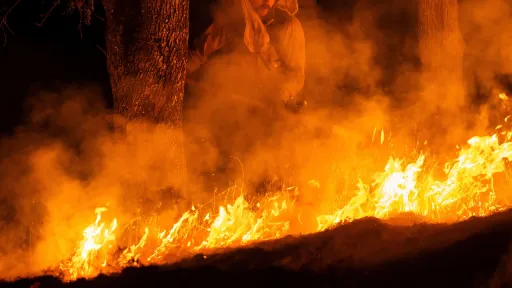The bandana around Kwame Adjekum's head tells its own story – soaked in sweat before the morning has properly begun.
In Ghana's upper east region, where temperatures now routinely punish those who work beneath the open skies, this construction worker measures the changing climate not in degrees but in the quickening throb of heat-induced headaches and the speed at which concrete sets.
"The sun... it is not like before," Kwame says, pausing to catch his breath.
"By 10am, the ground is burning through my boots. You feel dizzy, and your vision blurs. You have to take more breaks, although less work means less pay. It's a hard choice to make: your health or your daily bread," he tells TRT Afrika.
This is a common predicament across the continent. Isatou Jallow wages a similar battle against the elements in the otherwise fertile lowlands of The Gambia.
The rains, which once followed predictable patterns, have turned erratic. Average temperatures have climbed steadily upward, transforming her fields into a proving ground for endurance.
"The heat is a thief, stealing our energy, our harvest and our incomes," says Isatou, leaning on her hoe. "You drink water again and again but it doesn't quench your thirst. You see your crops wilting but can't do anything about it."
Hottest on record
A new report by the World Meteorological Organisation (WMO) and guidance from the World Health Organisation (WHO) reflect the scale of the crisis.
2024 was the hottest year worldwide on record, with average temperatures exceeding 40 degrees Celsius and even 50 degrees becoming commonplace in various regions.
Drawing on five decades of research, the report presents heat stress not as a distant threat but as an immediate danger.
"Heat stress is already harming the health and livelihoods of billions of workers, especially in the most vulnerable communities," says Dr Jeremy Farrar, WHO's assistant director-general. "This new guidance offers practical, evidence-based solutions to protect lives, reduce inequality and build more resilient workforces."
The consequences of recurrent heatwaves go far beyond short-term risks to health. Prolonged exposure to heat while out working in the open increases the possibility of kidney dysfunction due to dehydration and also neurological disorders.
The economic toll is just as devastating. Studies have shown that worker productivity drops by 2-3% for every temperature rise above 20 degrees Celsius, which can be catastrophic for families dependent on daily wages.
Devising a heat map
The WHO-WMO guidance prescribes comprehensive occupational action plans that need to be implemented through collaboration among employers, workers, unions and healthcare experts.
The recommendations target multiple fronts. Policies are required to account for local weather patterns, specific job requirements and worker vulnerabilities.
The guidance also suggests prioritising those most at risk – middle-aged and older workers, individuals with chronic health conditions, and those with lower physical fitness or income.

Education initiatives need to ensure that heat stress symptoms receive proper recognition and treatment from first responders, healthcare professionals, employers and the workers themselves. The report suggests that technological innovation and sustainable design principles could yield practical and affordable solutions at scale.
"Occupational heat stress has become a global societal challenge that is no longer confined to countries located close to the equator," explains WMO's deputy secretary-general Ko Barrett. "Protection of workers from extreme heat is not just a health imperative but also an economic necessity."
The urgency becomes clearer when considered alongside the International Labour Organisation's findings. Over 2.4 billion workers worldwide are exposed regularly to excessive heat, resulting in nearly 23 million occupational injuries annually.

Price of delay
For those bearing the brunt of rising temperatures, the statistics cited in the guidance represent their daily struggle for survival and dignity.
"We need shade, clean water and employers who acknowledge the dangers we face," says Kwame.
Isatou believes community resilience can only achieve so much. "We are strong people, but can't fight this alone," she tells TRT Afrika. "We need support to adapt to abnormal weather, and to find ways of working that don't put our lives at risk."
Kwame and Isatou are part of a growing chorus worldwide demanding protection for workers who build and feed the world with their toil.
With average temperatures projected to rise further as part of the climate change cycle, experts believe safeguarding workers' health and livelihoods has evolved from a policy preference to an imperative for humanity's survival and economic stability.



















